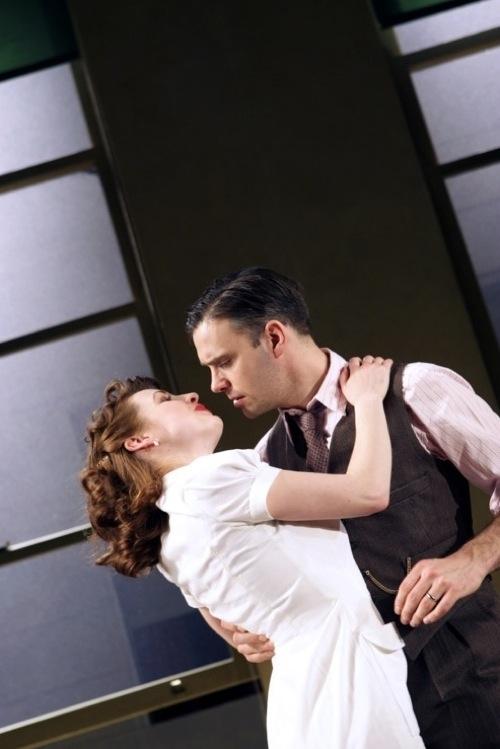“Love is no solution to life,” declares a line from Clifford Odets’s 1938 drama; and in straitened times, then and now, it’s a sentiment that carries considerable doleful weight. And yet every character here is in desperate search of that elusive something to elevate the banal business of day-to-day existence – a personal rocket to the moon. Without it, they are trapped in endless Monday mornings, soul-destroying work that doesn’t bring in enough to pay the bills, and relationships in which they turn into “two machines, counting up the petty cash”.
 Not that it’s without its own bittersweet savour. The longing of all the characters for spiritual connection, and for a sense of existential significance, is poignant, even when most earthily expressed. Hawes (pictured right) arrestingly suggests the mingled frustrations and disappointments of Belle. “I’ll elope someday,”’she threatens Ben, fear lurking beneath her assertive sassiness. “Then you’ll cry your blue eyes black.” Prince dismisses his rift with Belle in an aphorism – “I’m the American King Lear” – devours Cleo with his eyes, and gazes yearningly out of the window at the hotel opposite, behind whose shades he imagines all manner of thrilling sin being committed. Ben’s fellow dentist Phil Cooper (Peter Sullivan), falling hopelessly behind with the rent for his consulting room and drowning himself in drink, rages at his inability both to heal those who badly need his services but cannot afford them, and to make his own living. And Cleo, the temptress in flight from an impoverished upbringing, who practises movie-star poses before the waiting-room mirror and allows the smitten old Prince to buy her a poppy-red raincoat because she knows she looks sensational in it, is as terrified of desolation and negation as any of them. “Millions of people moving around the city,” she exclaims tremulously, “and nobody cares if you live or die.”
Not that it’s without its own bittersweet savour. The longing of all the characters for spiritual connection, and for a sense of existential significance, is poignant, even when most earthily expressed. Hawes (pictured right) arrestingly suggests the mingled frustrations and disappointments of Belle. “I’ll elope someday,”’she threatens Ben, fear lurking beneath her assertive sassiness. “Then you’ll cry your blue eyes black.” Prince dismisses his rift with Belle in an aphorism – “I’m the American King Lear” – devours Cleo with his eyes, and gazes yearningly out of the window at the hotel opposite, behind whose shades he imagines all manner of thrilling sin being committed. Ben’s fellow dentist Phil Cooper (Peter Sullivan), falling hopelessly behind with the rent for his consulting room and drowning himself in drink, rages at his inability both to heal those who badly need his services but cannot afford them, and to make his own living. And Cleo, the temptress in flight from an impoverished upbringing, who practises movie-star poses before the waiting-room mirror and allows the smitten old Prince to buy her a poppy-red raincoat because she knows she looks sensational in it, is as terrified of desolation and negation as any of them. “Millions of people moving around the city,” she exclaims tremulously, “and nobody cares if you live or die.”- Rocket to the Moon at the National Theatre until 21 June
 Find Clifford Odets on Amazon
Find Clifford Odets on Amazon













Add comment